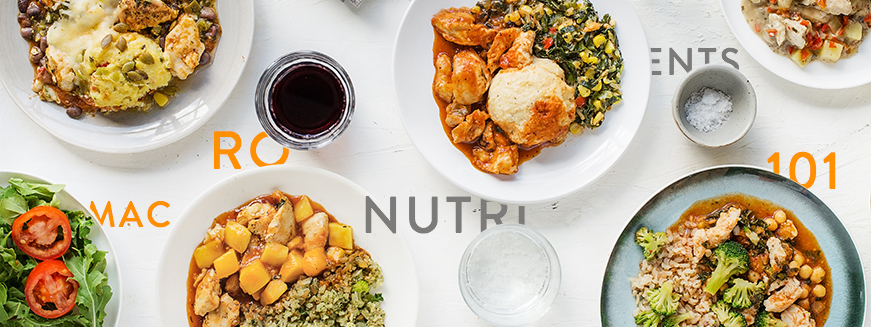The Fresh Blog
Lifestyle, Health, Nutrition & Inspiration from Luvo
Macronutrients 101
Forget about flavor for a moment. Ignore the joy you feel eating something delicious, and the satisfaction you get from making a meal that your friends or family rave about. Food, at its most basic level, is our fuel, and there are three types of nutrients in food that provide all the energy our bodies need. They’re called macronutrients, and you known them well: carbohydrates, fats and protein.
From our organ functions to tissue growth to immune systems, our bodies need macronutrients to operate. Each of the three types provides us with calories, though in varying amounts. Carbs and protein have four calories per gram, and fats provide nine calories per gram. Alcohol is the only other substance that provides us with energy, but because we don’t need it, it’s left out of the macro club. Counting macros is a thing people do when they want to make sure they’re getting the right amounts of each. Let’s take a look at what that means.
Carbohydrates
Carbohydrates are our main source of fuel, easy converted to energy in the body and also stored in the muscles for use later on. Both U.S. and Canadian health authorities recommend we get between 45 and 65 percent of our daily calories from carbohydrates. When we think of carbs, we often think of bread and pasta. Those are big ones, but remember that sugar is a carbohydrate too, and a major source of calories.
Fruits and vegetables are another source. They’re good because they also provide dietary fiber, which the body cannot digest and which helps clear out waste. Fruits and veggies also contain vitamins and minerals—also known as micronutrients—that help our bodies in different ways.
Protein
We’ve talked about protein before. It’s a hot topic: people seem to be trying to get more and more of it, though most experts agree that a fairly standard balanced diet provides enough protein to meet the recommended intake of 10 to 35 percent of your daily calories. Protein is essential for growth, which is why it’s important for kids and pregnant women to get enough, plus tissue repair and maintaining our immune systems. As most of us know, protein can be found in animal products, including meat, eggs and dairy, plus some plants, nuts, legumes and smoothies.
Fats
Fats get a bad rap, but they are essential too. They provide energy, help us absorb some vitamins, and make our food taste better. Most sources say we should get between 20 and 35 percent of our daily calories from fats, and it’s rare that we don’t get enough. Some types of fat are better for us than others. Unsaturated fats, found in avocados, nuts and olive oil, have been shown to decrease the risk of developing heart disease. The other two types, trans fats and saturated fats, have been shown to do the opposite.
Are you counting macros? Do you even know what that means? Let us know in the comments and on Twitter at @luvoinc.


